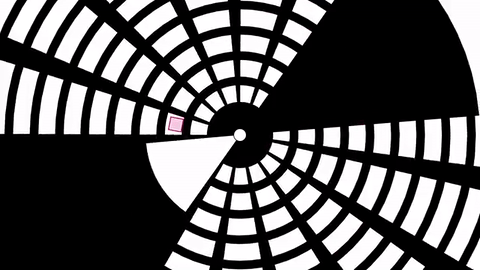Expand teaches you to dance like a level designer
Expand’s greatest deception is in giving the impression that its stark black and white and red color palette and plain geometric characters were born out of an inability to do anything more. Sandwiched between so many half-finished platformers and blocky top-down shooters, it is all too easy to cast Expand in with the lot as just another amateur, dismissible production. Expand is in turns far too subtle for its own good, as what screenshots fail to convey is the elegance and creativity that guides each screen and level of a game that in many ways closer approximates a digital dance. It is tremendously hard to do justice to Expand in words, as its genius is in its animation, simple shapes modulating and deconstructing around a pink cube trying to find a way out. What Expand asks from you is superficially simple – get through the maze, perhaps pressing a button here and there, and find the pink rectangle at the end. This straightforward goal becomes immediately complicated, however, once it becomes clear that these mazes are not static labyrinths but moving creatures, every wall and obstacle reacting to your presence as they collectively move and transform around a giant circle.

In many ways Expand represents an extension of the ideas of Duet, a game similarly focused around spatial awareness and poetic movement. But where Duet asked the player to react – to obstacles and emotive lines of text that collectively fleshed out a pseudo-storyline – Expand wants you to lead. Rarely does Expand push you forward, instead requiring that you take the first step and adjust your movements as you learn how the level is going to respond to you being within it. The experience would be oddly intimate if it wasn’t so bitterly challenging, a decision which at times causes the game to lose the rhythm it tries so hard to maintain as you fail again and again.
Expand intentionally refrains from putting forth much more than its art and atmosphere, and this can at times cause the experience to feel exceptionally lonely and empty. But that same stripped down approach makes it that much easier to lose yourself in an experience purposefully designed to never break until it has shown you all it has. There is something to be appreciated in Expand’s insistence that we needn’t go looking for things which don’t exist, and instead appreciate it for what it presents before us: a curious and extensive interactive animation that is so restrained as to cause even small deviations to come as a surprise. The experience may lack a soul, but in the end you barely miss it.


